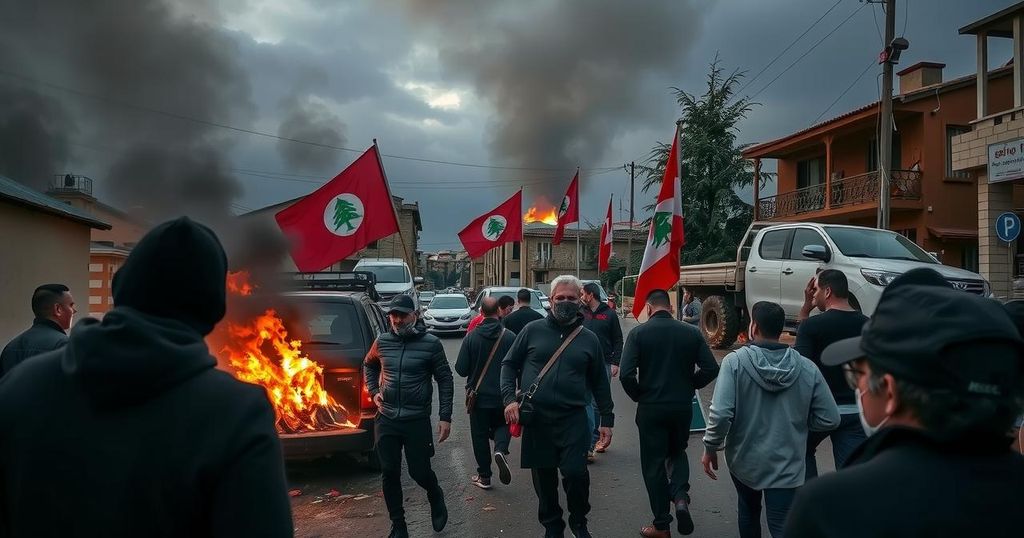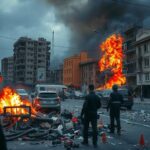Reviving Historical Tensions: The Impact of War on Lebanon’s Sectarian Dynamics
This article examines the complex interplay of sectarian tensions and historical grievances in Lebanon, particularly in light of recent Israeli military actions. It highlights the enduring impact of Lebanon’s civil war on contemporary society, the precarious position of Hezbollah, and the implications for Lebanon’s political future as communal solidarity faces potential strain.
As one traverses from Beirut’s picturesque Mediterranean coast to the formidable heights of Mount Lebanon, it becomes evident that this region, marked by its rugged terrain, has profoundly influenced the political landscape of Lebanon. This mountain range has served both as a natural barrier against invasions and as a refuge for religious minorities, particularly the Christians and Druze. Such histories and identities have shaped Lebanon’s intricate fabric, described by historian Kamal Salibi as a “house of many mansions.”
The foundations of Lebanon’s governance are rooted in a complex historical context, where power distribution among 18 recognized sects remains unresolved. Following the dissolution of the Ottoman Empire, French colonial authorities imposed a constitution that unjustly favored Maronite Catholics. As a result, they consistently maintained political dominance, leading to dissent among the Muslim majority and ultimately to inevitable tensions that manifested in significant social unrest. This unrest escalated upon the arrival of displaced Palestinians, culminating in the Lebanese Civil War from 1975 to 1990, where various militias fought over ideological and religious differences.
Remarkably, the civil war facilitated a gradual societal transformation, allowing diverse communities to reassess coexistence. However, the agreement reached in 1989 redistributed power, maintaining Hezbollah as the only militia permitted to retain its arms to defend against Israeli occupation. The years that followed saw a fleeting economic recovery, yet societal divisions persisted, reminding the Lebanese of their complex identities, often resurfacing in everyday interactions and decisions governed by religious affiliation.
Presently, escalating tensions due to renewed Israeli military aggression risk rekindling old animosities. Reports indicate a surge in internal displacement, with many Lebanese seeking refuge in neighborhoods predominantly occupied by different sects. Although initial responses showcased communal solidarity, emerging signs of discord raise concerns, especially as fears mount regarding potential discrimination against Shia refugees in various regions.
Hezbollah now finds itself in a precarious position. Historically, they have fostered alliances across sectarian lines, even with notable Christian factions. Yet, those alliances have begun to show strains, exacerbated by Hezbollah’s controversial involvement in the Syrian conflict and its handling of events around the Beirut port explosion in 2020. With rising speculation about Hezbollah’s potential weakening due to ongoing conflicts, political analysts suggest that there may be efforts toward redistributing power once again within Lebanese society. Michael Young, a senior editor at Carnegie Middle East, remarked on the urgency for Lebanese leaders to ponder, “If Hezbollah is weakened, what are the ways we can not find ourselves in this situation again?”
The article discusses the tensions and historical complexities that characterize Lebanon’s diverse society, particularly in the context of recent Israeli military actions. Lebanon’s intricate power dynamics stem from its sectarian makeup and the colonial legacy of favoring specific religious groups. The civil war has left lasting scars, complicating the social and political landscape, and the potential for renewed conflicts raises urgent questions about communal relationships and the future balance of power.
The tension in Lebanon, exacerbated by Israeli military operations, casts a shadow over existing sectarian relationships. Historical grievances remind the population of their divided past, and as Hezbollah faces scrutiny amid this crisis, the potential for a rebalanced political environment emerges. The unity observed thus far may be tested, urging all stakeholders to reflect critically on Lebanon’s intricate sectarian landscape to ensure a stable coexistence going forward.
Original Source: www.theguardian.com








Post Comment